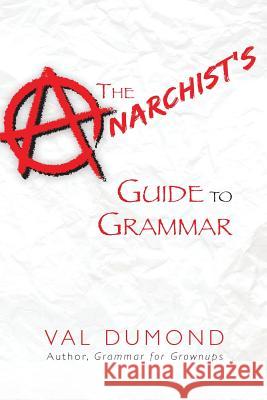The Anarchist's Guide to Grammar » książka
The Anarchist's Guide to Grammar
ISBN-13: 9780979746604 / Angielski / Miękka / 2012 / 308 str.
The Anarchist's Guide to Grammar: "Banish the "rules" of grammar in the U.S. " is the revolution called for by author Val Dumond. "Scary? Of course, but drastic measures must be taken. Just look at the state of language today The time is now Stand up and reclaim it " "We've been taking U.S. language for granted," claims this long-time writer. We make several assumptions: 1) that we have a language called "Proper English"; 2) that a set of "rules" lies in some mysterious place, written by some mysterious authority; 3) that one must follow those "rules" to speak and write correctly. Not so The time has arrived to banish what we call "rules" and expose the assumptions." Dumond asks: What would happen if we all spoke the language of our heritage? We would quickly learn the sound of the Tower of Babel - since US-language has come about by combining languages from (at least) 150 countries around the world. As immigrants enter the country, they bring with them new ideas, cultures, foods, music, and language. As they become settled, they combine their culture with US-ers, thus enriching all of us in the United States, including our language. In an amusing Introduction, Val explains how we have assumed there exists an incontrovertible set of grammar "rules" to be followed in order to speak proper, correct, good English. "We're not in England anymore " she points out. Oh yes, we started out with British "rules," but as we declared our independence, language changed, and continues to change. Do you really understand ordinary British English? Numerous pundits over time have drawn up what they consider the "rules" of grammar and forced them on their students. Yet, when those students run up against someone who studied a different set of "rules," confusion and doubt rear their heads. Must we in the U.S. speak "proper English" or do we have a language all our own? After clarifying the conundrum of US-language, Dumond offers guidelines to aid writers in determining what constitutes understandable language. Those guidelines don't depend on memorizing all the crazy names for the parts of language, but rather the guidelines focus on how those parts function. Nouns and pronouns become Things; adjectives and adverbs become Modifiers; punctuation becomes Rules of the Road - all presented in easily understood language, with examples to boot. Included in the guidelines are ways to decide which nouns to capitalize how to discern the difference between plural and possessive nouns how pronouns perform ways to vary word modifiers how to add modifying phrases and clauses use of the little words that serve as the glue to connect words into sentences how to use the dots, dashes, and curly cues we call punctuation. But she doesn't stop there. Writers will especially enjoy the freedom offered to create new words and put together sentences and paragraphs. She offers suggestions to use numbers and inclusive language, as well as offering four ways to improve spelling. The solution to the confusion of US-language seems so simple. Look at the "rules" that come close to your interpretation, then modify them to make them work for you. Set up Your Style Manual, rather than depend on style manuals put together according to some other group's interpretations. And she shows you how. All this is included in The Anarchist's Guide to Grammar: toss out the assumptions, clarify them, pick up some basic, helpful guidelines, and write with power and assurance. No longer will you need to ask, "What are the rules for writing Proper English?" At last, you'll understand why there aren't any. At last you can write your own guidelines."











